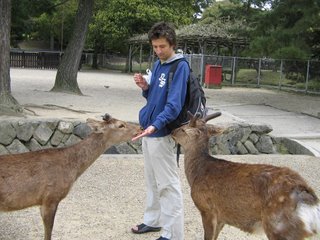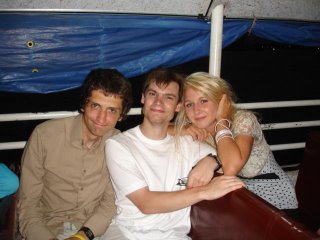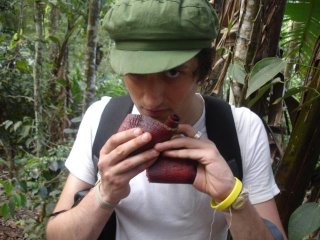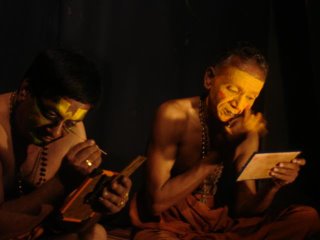 Day 39 - 27th April 2006
Day 39 - 27th April 2006Hiroshima
There are only a few countries with nuclear weapons: Russia, the United States, the United Kingdom, France, China, North Korea, India, Pakistan, Israel and maybe a few others who haven't announced their possession. There are 29,000 nuclear warheads deployed throughout the world at present. If you are to follow the United States' current attitude to the nuclear non-proliferation treaty (1968) and the comprehensive test ban treaty (1996), that these are 'documents of the past', then we are at the dawn of an new age of nuclear arms. This was always an exclusive club though; you had to be in the right place at the right time to get in. You had to have the force, the paranoia and the propaganda machine to do it.
Now that there's an unwelcome applicant to this club, Iran, which doesn't support the right UN-friendly neo-liberal policies, it's time to take action. Thank you John Bolton.
Anyway since there's a potential new nuclear terror threat and a corresponding war against it, we'd better be prepared hadn't we? John Reid's got it in hand, a new Trident replacement, for which AWE Aldermaston and Burghfield are already building the necessary buildings. Some people are trying to draw people's attention that there was no public debate over this issue.
60 years have passed since a nuclear weapon was used in warfare. 20 years have passed since the last major nuclear energy generation accident at Chernobyl. Time passes, people die and new generations are born into, but relatively unaware of the nuclear age. Fortunately Hiroshima is still something lodged in Western consciousness.
After the Manhattan project was complete and partly to justify it's cost, a list of potential targets in Japan were drawn up, mainly in an effort to end the Pacific War and curb the Soviet Union's influence in the area. Hiroshima was chosen as it had not previously been bombed (they needed to measure the results of the bomb on virgin soil), itwas a massive historical military stronghold and it was believed that it did not contain an allied POW camp. On August 6th 1945 at 8.15am the B52 Enola Gay dropped little boy on Hiroshima. That bit most people know. It destroyed everything within several kilometres radius. Thousands died instantly, tens of thousands of hibakusha (A-bomb survivors) died subsequently. About 200,000 have died in total as a result of the bomb or it's after effects to date. It flattened the city's building's instantaneously.
So James and I went. Hiroshima Peace Memorial Park with it's museum and memorial hall stand as a permanent testament to the city's new status as a stronghold and centre of international peace. After stepping off the street car, the first sight that greets you is the A-bomb dome. Formerly Hiroshima Prefectural Indutrial Promotion Hall, the building was almost directly below the exact place where the bomb exploded. Saved by a campaign to have a permanent reminder of the bomb's damage, despite the inevitable anxiety and grief it caused to the city's inhabitants trying to recover from the single worst atrocity (in terms of scale) ever committed during a war. When the bomb hit, because the dome was directly underneath it was not destroyed, but the intense heat caused the steel shell to instantly fuse the metal. As is often the case, when you visit places of extremely historical significance, it's difficult to imagine what happened here, especially in thriving modern day Hiroshima, where Mazda is based. We chatted to a Japanese tourist about why we were there, and he was pleased that we'd made the effort to visit; apparently the attitude to the history of the A-bombs is changing in Japan now.
The Peace Memorial Park and Museum used to be visited by hundreds upon hundreds of school children everyday (and there were plenty there during our visit), but apparently their numbers are dwindling. Every year on August 6, however, the Japanese Prime Minister joins the mayor of Hiroshima at a speech called "The Peace Declaration" to commemorate the atomic bombing of the city.
In the museum, an audio guide gives you a good history of Hiroshima, Japan's expansionism and total military focus during the First Sino-Japanese War (1894-1895) and Russia in the Russo-Japanese War (1904-1905), moving onto the scond Sino-Japanese war, the Axis and the Pacific War. It holds copies of the Manhattan project documents, during which the A-bomb was approved for use by Truman and Hirshima was selected. It describes in detail what happened to people after the A-bomb and displays pictures of those instaneously burnt to death or running away from the hypocentre with flesh hanging off them. It shows scorced roof tiles bricks, bent metal girders and shadows cast upon bricks of those who were caught in the full glare of the synthetic sun. A 360 degree view of central Hiroshima after the blast shows a city totally flattened as far as the eye could see. Many people were permanently disfigured or suffered perverse side-effects such as black fingernails or bizarre discharges. The bombs' after-effects and the subsequent nuclear arms race, were also covered.
I found the Peace Memorial Hall most intersting; it holds a massive public database carrying information on all of the hibakusha, including personal accounts or the recollections of relatives. You could search alphabetically for each and every victim. This was clearly unpleasant, and I could only stomach so much; for instance how people searched among the rubble for their children. One story was of a man who searched for day and days for his daughter and finally recognised her corpse by her scorched wooden sandals in the wreckage of her school. Many carried dying loved ones home and nursed them for several days before they finally succumbed to radiation poisoning. Within the country hibakusha were often treated with contempt or regarded in horror as people thought they might be contagious or cursed in some way, though general attitudes changed over time.
The H-bombs subsequently developed and tested have been up to 1000 times more powerful than the one dropped in Hiroshima, using nuclear fusion rather than fission. It is unsure how powerful you theoritically make a nuclear bomb.
 It pleases me that the Japanese school kids we've met (and not just the ones in Hiroshima as in the picture) always like to make the two-fingered peace sign in photos. Beautiful sentiment; I hope it becomes embedded in the culture. Peace to humanity.
It pleases me that the Japanese school kids we've met (and not just the ones in Hiroshima as in the picture) always like to make the two-fingered peace sign in photos. Beautiful sentiment; I hope it becomes embedded in the culture. Peace to humanity.





















